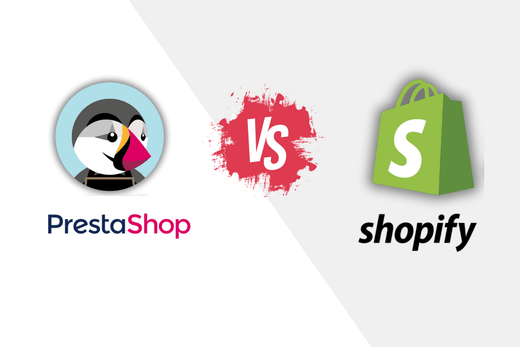Choosing the right platform for your online store is a difficult decision that can determine the success of your eCommerce. One of the main questions that often arises is the difficulty of choosing between Shopify and Prestashop, as they are two of the most popular CMSs and each offers its own strengths and weaknesses.
In this post, we'll conduct a detailed comparison between Shopify and Prestashop to help you make a decision you won't regret later.
Keep reading!
Shopify or Prestashop, which is better?
Shopify and Prestashop are two e-commerce solutions that stand out in the market for different reasons. Shopify is known for its simplicity and comprehensive approach, while Prestashop stands out for its flexibility and customization capabilities.
Below, we'll analyze the two CMSs (Content Management Systems) in terms of the key aspects you should consider when choosing:
Ease of Use
Shopify
Shopify is characterized by its intuitive and easy-to-use interface. No advanced technical knowledge is required to set up and manage a Shopify store, although everything depends on your needs.
Overall, the platform offers a seamless user experience with a guided setup process, making it easy to launch your online store.
Prestashop
Prestashop has a steeper learning curve. Although it offers more flexibility and customization options, its interface can be slightly overwhelming for inexperienced users. It requires more technical knowledge to take full advantage of its features.
Flexibility and Personalization
Prestashop
In this case, Prestashop excels in terms of flexibility and customization. It's an open-source platform, which means developers have full access to the source code and can modify it to suit their needs in a wide range of ways.
This option can be especially interesting for businesses that require very specific features and want complete control over their eCommerce. However, it will require a robust technical team.
Shopify
Although this CMS isn't open source, it offers a wide range of Shopify themes and apps in its app store. While it doesn't allow for the same depth of customization as Prestashop, its app ecosystem is robust and can meet almost all of an online store's needs.
Additionally, for more advanced customizations, Shopify Plus offers greater customization capabilities and flexibility.

Costs of each platform
Shopify
It operates under the model of Shopify's various plans, which vary in price and features. These plans include hosting, support, and updates, simplifying budgeting for many businesses.
On the other hand, there are additional costs associated with certain premium apps or themes. However, the cost structure can be clear and predictable, which is beneficial for business planning.
Prestashop
Being an open-source platform, it's free to download and use. However, keep in mind that costs can quickly add up due to the need for hosting, custom development, and additional modules.
It's important to know that this platform will likely entail higher maintenance and security costs, and therefore, these costs are less predictable. However, this will all depend on the level of customization and support required.
Support and community
Shopify
It provides 24/7 support through various channels: live chat, email, and phone. The quality and availability of Shopify support is a huge plus, especially for new businesses that may need frequent assistance.
Prestashop
It has an active community and a forum where users can seek help and share knowledge. Official support is available, but it usually comes at an additional cost. Furthermore, the PrestaShop developer community can be a valuable resource for resolving technical issues.
Integrations
Shopify
It offers a wide variety of integrations with third-party applications, from marketing tools to inventory management systems. This ease of use allows online stores to expand their capabilities without significant technical complications.
Shopify integrations are generally easy to implement and maintain, which once again simplifies eCommerce management.
Prestashop
It supports integrations with a wide variety of modules and plugins. However, integrating these modules may require more technical intervention and configuration compared to Shopify.
As we've been saying throughout this post, PrestaShop's flexibility can be beneficial for businesses with very specific needs, but it can also require more resources to implement.
SEO and other marketing channels
Shopify
Shopify includes built-in SEO tools that are easy to use. The platform allows you to customize meta tags and URL slugs (since the directory structure for each content type is static), and has integrations with marketing tools like Google Analytics and Facebook Ads. Shopify's simplicity in terms of SEO makes it easy for stores to optimize their search engine visibility, although, as with other CMSs, advanced SEO knowledge is required to achieve good rankings.
Prestashop
Prestashop also offers robust SEO capabilities, but requires more manual configuration. Its SEO modules allow for deep customization, which can be beneficial for businesses with specific optimization needs. However, implementation can be more complex compared to Shopify.
Conclusions
We understand that comparing Shopify vs. Prestashop can be complex. So, we'll summarize it for you:
Shopify is ideal for those looking for an all-in-one solution that's easy to use and quick to implement. Its subscription model and ongoing support make it suitable for those who want to focus on their business without worrying about the technical infrastructure.
Prestashop, on the other hand, is perfect for businesses that require high levels of customization and have more technical resources to manage a more complex platform. It's a good option if you have a dedicated technical team.
At Kansei, we're Shopify specialists, so we can help you get the most out of this platform to boost your e-commerce. We can also handle not only Shopify development but also maintenance and SEO .




